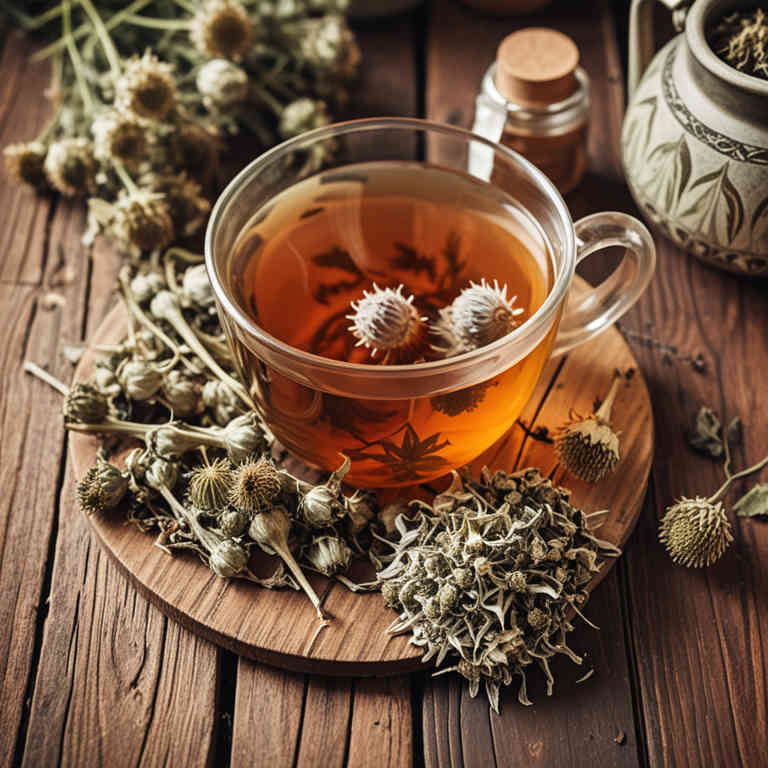Arctium lappa tea for medicinal use

Arctium lappa tea is a herbal preparation made from the dried leaves and seeds of the greater burdock plant.
It has been traditionally used in herbalism for its purported detoxifying and anti-inflammatory properties. The tea is often consumed to support digestive health and skin conditions. It may also be used to alleviate symptoms of respiratory issues and to promote lymphatic drainage.
Due to its potent nature, it is typically used in short cycles under the guidance of a qualified herbalist.
Uses
Arctium lappa tea has been used to treat digestive issues, skin conditions, and respiratory ailments for centuries.
Historically, it was valued in traditional Chinese medicine and European herbalism for its detoxifying and anti-inflammatory properties. In traditional use, it was often prepared as a tea to alleviate symptoms of indigestion, gallbladder problems, and skin rashes. Modern research suggests it may support liver function and have antimicrobial effects, making it a popular choice in contemporary herbal remedies.
Today, it is still used in herbal medicine to promote digestion and support overall wellness.
Benefits
Arctium lappa tea has health benefits such as supporting digestive health, reducing inflammation, and promoting skin health.
It is traditionally used to alleviate symptoms of digestive disorders like bloating and indigestion due to its high content of compounds like lappa acid. The tea may also help in detoxifying the body and supporting the immune system. Its anti-inflammatory properties can aid in reducing swelling and pain associated with conditions like arthritis.
Additionally, it is believed to have antioxidant effects that contribute to overall well-being.
Constituents
Arctium lappa tea active constituents include compounds such as chicoric acid, lappaic acid, and flavonoids, which contribute to its medicinal properties.
These components are known for their anti-inflammatory, antioxidant, and antimicrobial effects. Chicoric acid is particularly noted for its ability to support immune function and reduce inflammation in the body. The tea is traditionally used to aid in digestive health and may help alleviate symptoms of conditions like irritable bowel syndrome.
Additionally, the presence of flavonoids may support liver detoxification and overall cellular health.
Preparation
To make Arctium lappa tea, begin by gathering dried Arctium lappa leaves and flowers, which are typically available from herbal suppliers or specialty stores.
Rinse the herbs thoroughly to remove any impurities, then measure out about 1 to 2 tablespoons of the dried material. Place the herbs in a heatproof container and pour boiling water over them, ensuring the herbs are fully submerged. Let the mixture steep for 10 to 15 minutes, then strain the liquid through a fine mesh strainer or cheesecloth into a cup.
This tea is often consumed warm and can be enjoyed alone or with a touch of honey for added flavor.
Side Effects
Arctium lappa tea may lead to gastrointestinal discomfort, including nausea, vomiting, and diarrhea, due to its high concentration of compounds like lappaic acid.
It can also cause allergic reactions in individuals sensitive to plants in the Asteraceae family, such as ragweed. Long-term use may interfere with liver function, as some studies suggest it has hepatotoxic properties. Additionally, it may interact with certain medications, particularly those affecting the liver or blood clotting.
Because of these potential risks, it is advisable to consult a healthcare professional before using Arctium lappa tea, especially for prolonged periods or in high doses.